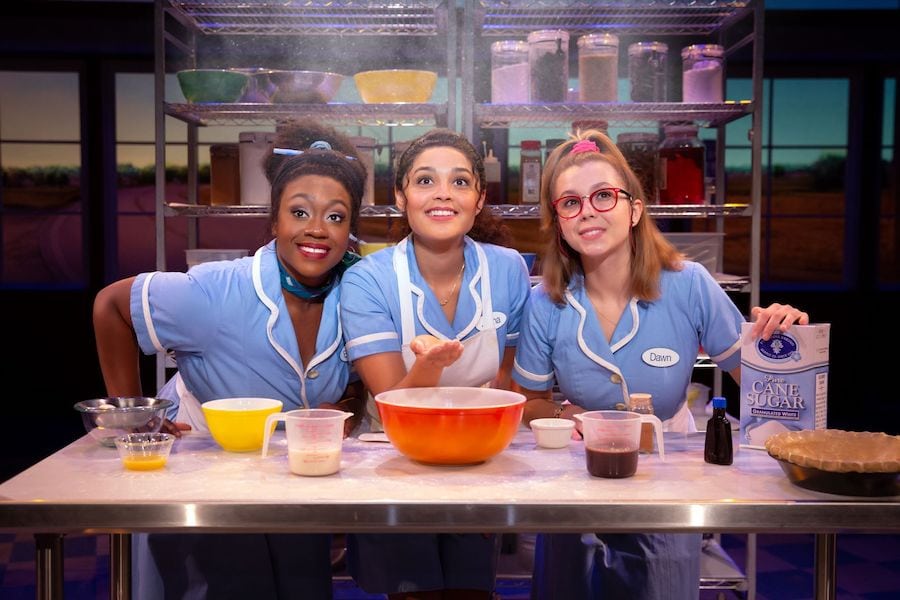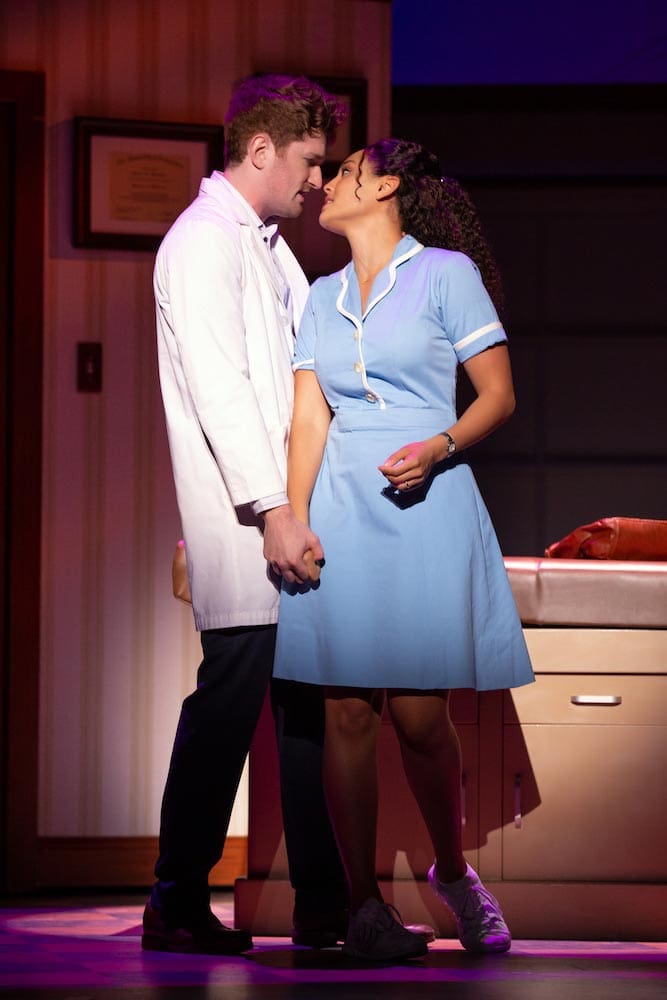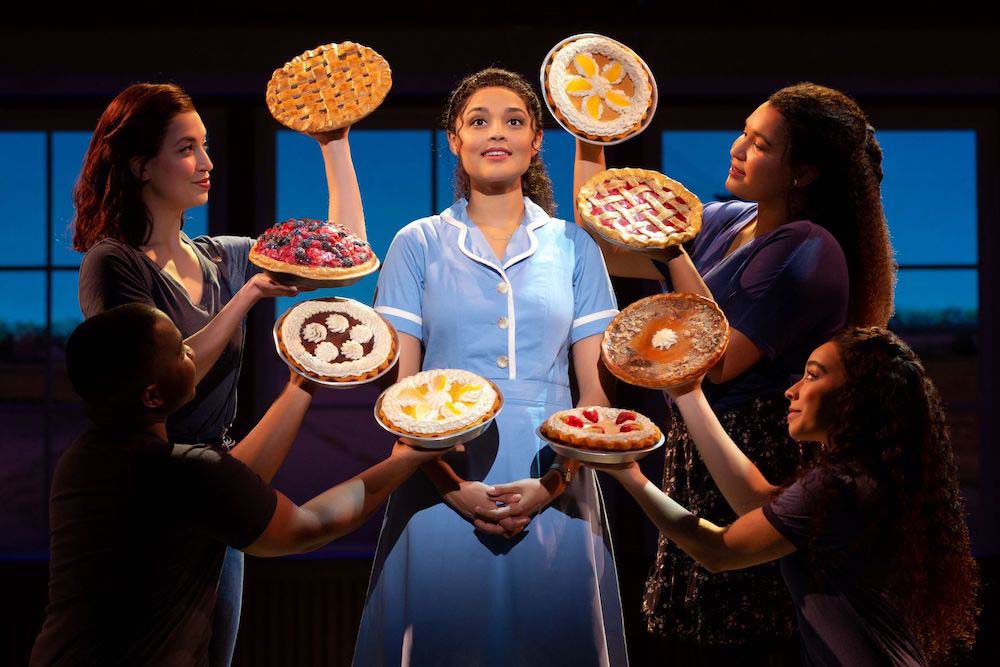Sex and romance appear in the unlikeliest of places for the waitresses in Waitress the musical. Jenna finds romance with her doctor, Becky is doing it with her boss, and cute little Dawn swoons over a guy who likes to dress up for Paul Revere reenactments.
In one comical scene in Sara Barreilles’ 2015 musical about a waitress facing an unwanted pregnancy with her abusive husand, these hookups play out in flagrante before our very eyes. Three snapshots of amour roll along the stage on moveable set pieces: Becky kissing in a diner, Jenna contorted on the doctor’s table, and Dawn in Betsy Ross period attire on her boyfriend’s lap, a smile as big as the sun on her face. It is a laughable moment in the play, but it is also the climax (pardon the pun) of the journeys the three women have been on to find love and connection.

But the true love story at the center of Waitress has nothing to do with men. The friendship between Jenna, Becky, and Dawn — three waitresses at a pie shop in the American South — is the constant thread that brings heart to this charming story. Men may come and go, life has its ups and downs, but a solid female friendship? That can be forever.
Like when Jenna finds herself broke, pregnant, and potentially homeless while fleeing her abusive husband Earl.
“This ain’t no affair,” Becky tells Jenna while offering her a place to live. “I’m in it for life.”
Waitress the musical is at its best when harnessing the restorative power of female friendship, perhaps because it is one of the first Broadway shows to feature an all-female creative team. Based on the 2007 indie film by Adrienne Shelly, the Broadway production brought on Diane Paulus as director, Sara Bareilles as composer and lyricist, Jessie Nelson as book adaptor, and Lorin Latarro as choreographer.
The second national tour of the show played a brief three-day stint at Capital One Hall last weekend. Bareilles’ engaging and emotional score remains a source of joy, but this non-Equity tour is a pale shadow of its Broadway counterpart.
While not a total flop, the tour suffers from the tweaks made by Tour Director Susanna Wolk and Tour Choreographer Abbey O’Brien. The staging remains largely unchanged from the Broadway version, but the entire production has an exaggerated, comical feel to it. The actors overact and the dance moves remind one of high school theater. The three female leads are frequently pitchy and struggle to reach the higher notes in Bareilles’ complex score.

Jisel Soleil Ayon is appealing and charismatic in the central role of Jenna. She shines in “She Used to Be Mine,” one of the show’s most notable numbers, exuding pain and filling the stage completely with her presence and voice. Ayon has great chemistry with David Socolar, who plays Dr. Pomatter with over-exaggerated, almost slapstick comedy. But her voice falters just when it needs to soar, and that keeps a good performance from being great.
The strongest of the female performers is Kennedy Salters as Becky, one of Jenna’s two co-workers and friends. Her spoken lines are delivered with a stylized staccato that brings extra sass to the character. Her Act Two opening number “I Didn’t Plan It” is a highlight of the show. But Salters and Gabriella Marzetta, who plays Jenna’s other friend Dawn, both struggle with the higher end of the score. Only Brian Lundy, whose performance as Dawn’s nerd-on-steroids boyfriend Ogie is meant to be comical, hits the right notes, musically, and thematically.
Scott Pask’s set design achieves great things considering the sets must be packed up and hauled to a new destination each week. The constant focal point is a large screen spanning the rear of the stage onto which is projected a series of rural skylines featuring morphing sunsets and powerlines. Upon this backdrop, various set pieces roll on and off stage. Joe’s Pie Diner is a retro space with glossy red counter stools and a neon sign. Jenna and Earl’s home is wood-paneled and modest.
The scenes between Jenna and her abusive husband Earl are so tense that they are hard to watch, and that is a compliment. Played by Shawn W. Smith, Earl is a sobering presence in the show, arousing discomfort with the violence that bubbles just under the surface of his performance.
Capital One Hall opened its doors earlier this fall and it is a welcome new addition to the DC region. The auditorium itself is gorgeous. The seats offer ample legroom and great sightlines. The acoustics are top-notch. And — not a small detail — the restrooms are large, ensuring a quick trip to the ladies’ room rather than the long lines women often face at older theaters. Two large bars in the sizeable atrium sell drinks and snacks. (The venue is allowing drinks to be taken into the theater, which resulted in many people enjoying the show with their masks down around their neck, something I had not seen at other DC venues post-pandemic.)
But I was disappointed overall by the amateurish nature of Capital One Hall’s inaugural musical. Non-Equity productions rarely have the polish and pizzazz of their more elegant Equity cousins, which feature more established performers who frequently have Broadway credits to their name. While there is a place for these productions on the road, they should not be advertised as a chance to see Broadway from home, as Capital One Hall sells its Broadway programming. For people who haven’t had the opportunity to travel to NYC for an actual Broadway musical, seeing a lackluster, watered-down version might be enough to turn them off of musical theater entirely. There is nothing worse than having your emotional catharsis interrupted by an off-key high note at the climax of a ballad.
The price is right for patrons looking to see a recent or current Broadway musical at an affordable price. Tickets to Capital One Hall’s next production, Fiddler on the Roof, range from $60 to $100, less than the $150 ticket for a good seat to the Kennedy Center’s next musical, Beautiful. And there doesn’t seem to be a bad seat in the house in the 1,600-seat mainstage theater.

Capital One Hall will also be a great new venue for concerts. Josh Groban was the venue’s inaugural performer last month, and Broadway favorite Darren Criss is on the schedule for December. These are events I very much look forward to. But I will be wary about future Broadway musicals if Capital One Hall continues to schedule low-caliber tours. DC audiences are too savvy for that. We expect better.
Running Time: Two hours and 50 minutes, including a 20-minute intermission
Waitress played from October 29 to 31, 2021 at Capital One Hall – 7750 Capital One Tower Road, in Tysons, VA. For tickets to future Capital One Hall events go online.
SEE ALSO:
A look inside Capital One Hall, the DMV’s grand-new venue by David Siegel






Agree completely about the quality of the performance. I didn’t see the Broadway version but it is hard to imagine the show as first rate no matter what cast is involved.
The new Capital One Hall is fabulous, though. Can’t wait for future high quality shows. Sadly, Darren Criss has canceled.
Oh, bummer! I hadn’t heard that he had canceled. I would have been there to see him in a heartbeat! Thanks for your comment. Always glad to hear feedback!